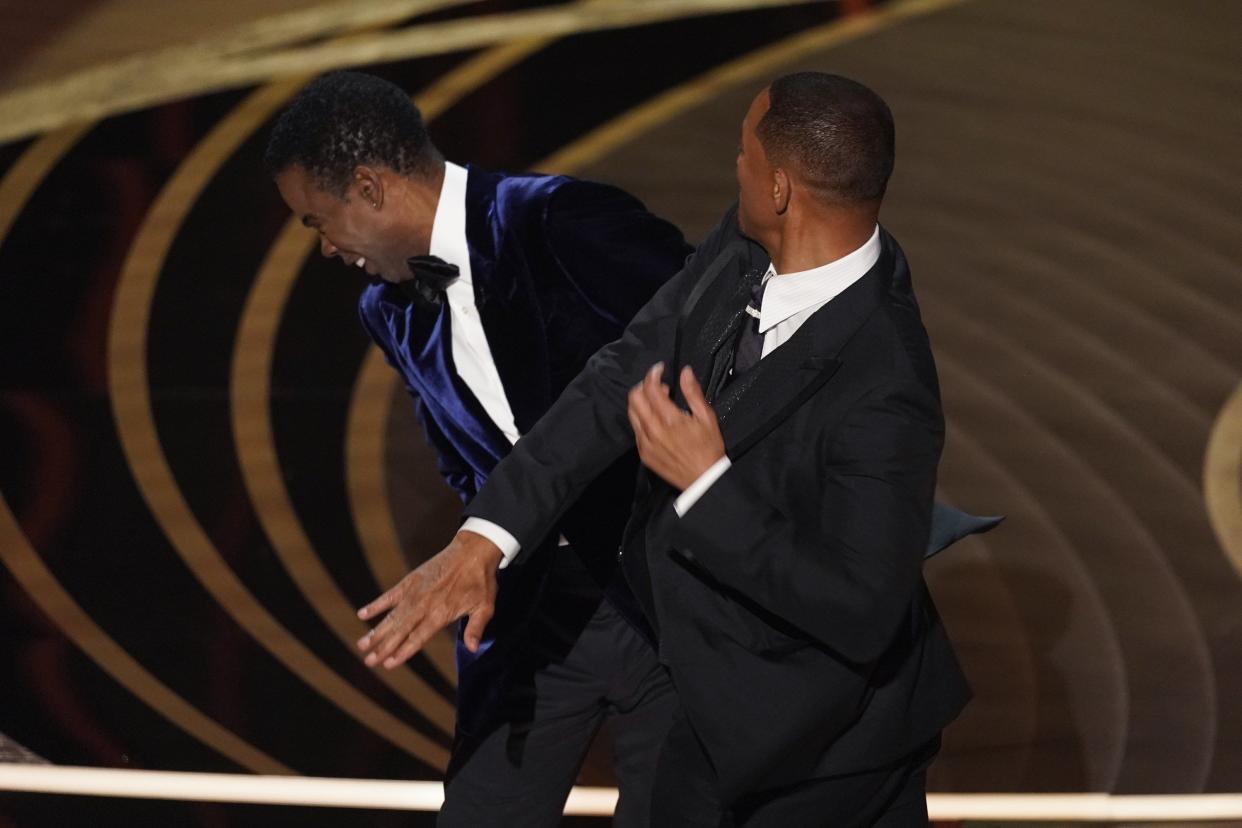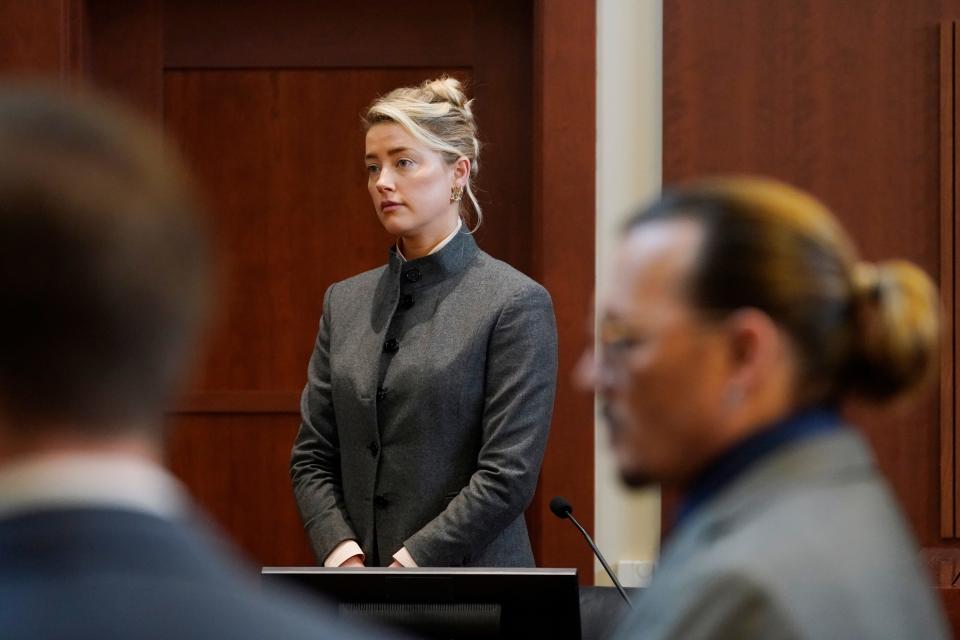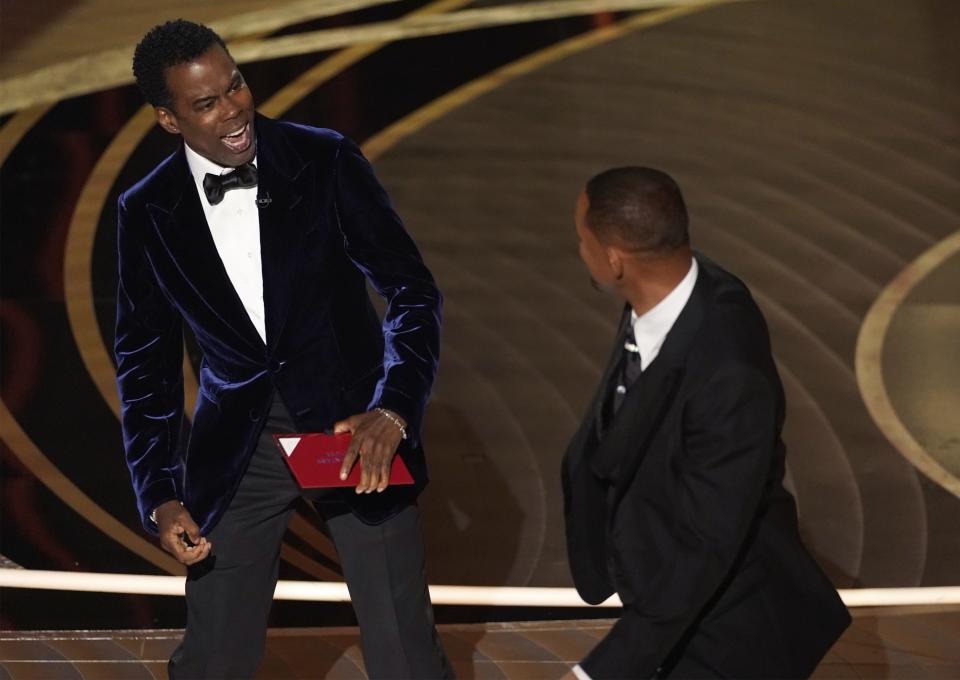Ronsisvalle: You could take this advice, or react like Will Smith; the choice is yours

- Oops!Something went wrong.Please try again later.
Support local journalism. A digital subscription is incredibly affordable and makes you the most informed person around. Click here and subscribe today.
It was the slap heard around the world.
Will Smith, in what might be one of the most public self-sabotaging events in recent history, responded to Chris Rock’s joke about Jada Pinkett Smith with what can only be described as shocking hostility.
He advanced toward the stage during the live broadcast of the Oscars and slapped an unsuspecting Chris Rock right in the face.
The response to Smith’s behavior has been fascinating for me as a psychologist.
Somehow, people who watched the same event unfold have had dramatically different views of whether Smith's response was healthy or unhealthy.
I know this comes as no surprise when you look at the polarized nature of our culture at this moment in time, and as a professional who works with individuals who struggle to manage their emotions daily, one thing is clear about this situation: Smith‘s response was actively hostile and oppositional.
He reacted to an unexpected intense situation with unrestrained anger, spite and incredible arrogance.
Dr. Mike's previous three columns:
Growing issue: Depression among all age groups is swelling; treatment is the best solution
It's OK to seek help: Stigma of addiction is leading reason why more people don't seek help
Let kids be kids: Adolescents feel more pressure than ever. Let’s give them room to be kids
For the record, I'm not questioning Smith’s value as a human or the nature of his heart.
I’m sure he’s a good man who had a complicated emotional response to a situation with which he lacked the coping skills to handle.
I would say Smith‘s behavior is an extreme example of an incredibly toxic pattern that is emerging across our culture.
It is now perfectly acceptable to respond with intense antagonism to any individual that has a different opinion, perspective or belief system.
This antagonism, characterized by active hostility, opposition and mean-spiritedness is widely excepted in almost every corner of our society.

For another high-profile example, we don’t have to look any further than the circus of the Johnny Depp v. Amber Heard trial.
The amount of aggression and hostility described by both parties is, again, incredibly shocking.
However, it’s not just the Hollywood elites who are normalizing this kind of antagonism.
The political arena is filled with individuals who are determined to respond to each other with this toxic antagonistic personality.
Take, for instance, Alexandria Ocasio-Cortez or Madison Cawthorn. Although they come from two different extremes of the political spectrum, they both have built an identity around their ability to be divisive, condescending and aggressive to advance their cause.
This is not a Republican problem or a Democrat problem; it’s a culture problem.
The fact these politicians, who are supposed to be compassionate statesmen, consciously operate in such an antagonistic manner is proof that this is a cultural phenomenon that we must all address together.

Before we get righteously indignant by how everyone else is supporting and propagating this toxic culture, we should all take a good strong look in the mirror.
My guess is we can all see these traits bubbling up in our interactions if we are willing to be honest.
At the very least, we all know people who are centered in this toxic antagonism.
You know, the people in your life who are just plain mean and refuse to cooperate in any kind of joint venture.
Their social media feed is full of criticism, spiteful comments and an arrogant refusal to engage in civil discourse about disagreements.
It’s an epidemic, and it’s the kind of relational posture that leads to a society where an individual feels entitled to walk on stage at the Oscars and physically attack a comedian when the joke is ill-received.
Why are we dealing with the problem of toxic antagonism?
At this point in the dialogue, you are probably asking yourself a couple of questions: How did we get here culturally? Why are we becoming so antagonistic?
There are two potential explanations.
For starters, interpersonally aggressive and antagonistic individuals sometimes have low motivation to change because their behavior works in some ways.
Think about it — bullies feel like their behavior helps them get things done. It helps them affect change on those around them.
The sad part is that they are probably right.
For the most part, those interacting respectfully with others tend to shy away from confronting the antagonistic bully.
When speaking our opinion in a clear, respectful way elicits a sarcastic and aggressive response, many people will back down.
So the bullies end up winning by default.
If there’s any question about whether or not this is true, log onto your Twitter account for an hour or so this afternoon and you can see this pattern playing out over and over again.
Recent research completed by a team at the University of Georgia echoes these principles.
They found that while most people with negative personality traits have a strong desire to change, those who are inherently antagonistic seem to have a low motivation for change.
In fact, only 15% of the sample said they wanted to be less antagonistic.
Sadly, 23% of the sample wished they could be even more antagonistic.
Even though some of the individuals in the study could rationally understand that toxic, antagonistic and aggressive behaviors did potentially impair their ability to relate, they felt like antagonism worked for them in various ways.
So much so that they were not interested in changing that part of their personality.
Some of the potential rewards that these individuals find in their toxic antagonism include a bold social presence, the ability to advocate for the self and greater interpersonal control.
In short, individuals who struggle with this aggressive antagonism have a hard time laying this personality trait down because it makes them feel powerful and in control.
Let’s face it, in our world of 24-hour access to other people on social media platforms, bullies are the ones who get the attention.
The fact that they come across as arrogant almost becomes irrelevant as they bask in the histrionic glory of social recognition and popularity.
We can’t leave a discussion of why we are dealing with this cultural phenomenon of toxic antagonism without looking a little deeper into the emotional issues underneath the behavior.
Thousands of hours of clinical work with clients have taught me one relevant truth: sometimes it is easier to fight than it is to be sad.
Sometimes it’s easier to lash out than to feel scared or powerless.
Let's revisit our example of Will Smith; it’s clear he was not feeling empowered and confident at the moment of his implosion.
Instead of having a functional response to the emotion stirring inside him, he resorted to an aggressive response that allowed him to feel less vulnerable and powerless.
This isn’t an excuse for Smith’s behavior, and it’s not an excuse for all of us that take the bait and act out in aggressive and antagonistic ways, but it does give us a perspective that allows us to respond differently to the bullies.
Ultimately, our response to those who are being toxically antagonistic is the only thing that will help us turn the tide in our world.
How do we respond to people who are behaving aggressively and antagonistically?
Confront antagonists with confidence
We’ve established these toxic and aggressive people are ultimately looking for control and attention.
As we interact with these individuals, our job is to ensure that we don’t let the constant criticism and intimidation put us in a situation where we attempt to please them.
We have to be willing to speak the truth in love no matter how extreme the antagonism gets.
This action requires deep confidence and emotional stability that allows us to address issues while we concurrently manage our own emotions.
We can’t give the bullies power over our sense of self or need for them to agree with us.
All we can do is be clear, direct, open and honest while we simultaneously model how it looks when an adult regulates emotion.
Chris Rock did an incredible job regulating his own emotions as he responded to Smith’s assault.

It’s hard to imagine a more difficult situation for a man to be in, but Rock handled himself like a professional and with incredible confidence.
It would’ve been easy for him to respond by returning aggression for aggression, but Rock acted like an adult, used humor to deflect the situation, and demonstrated to Smith that his aggressive behavior was not going to ignite a hostile reaction.
I’m not sure I would’ve ever imagined I would be waxing on about the emotional stability of a comedian, but Rock provided an excellent example of how to respond to a bully.
Measure the amount of attention you give an antagonist
Knowing that antagonists are resistant to change because their behavior works, we must minimize the attention we give them.
This is especially true on social media and other platforms where these individuals thrive.
Make it a point to speak the truth with stability, but don’t engage the process with them.
Using humor can work in the situation, but at some point, it is best to acknowledge shallow brooks are noisy and move on.
Returning fire in an aggressive manner only puts you in a battle with someone who is ultimately willing to say and do anything to win a war of words. It’s not worth it.
Operate with character and integrity
Finally, the true victory over antagonistic and aggressive individuals is to recognize and remember who we are.
We are better than this.
You are better than this.
I don’t care how toxic someone is on Twitter; we must remember that our character and integrity prevent us from responding in combative ways that fuel the need for attention by bullies.
You can’t regulate their emotions.
Remember, this is where grace comes in. While Will Smith deserved a punch in the face, Chris Rock gave him grace and mercy in the moment.
While the people who are aggressive toward us might deserve our bellicose response, our integrity mandates that we respond in ways that are consistent with our value system.
Our character demands we respond with grace.
The good news is, if we can remain confident and calm while we regulate our own emotions, measure the amount of attention we give the bullies, and operate out of integrity and character, I am confident we can right the ship.
Dr. Mike Ronsisvalle is a Licensed Psychologist and the President of LiveWell Behavioral Health, a psychological services agency that provides counseling to clients of all ages and addictions treatment to adolescents and adults. You can find him on the web at www.LiveWellbehavioralhealth.com and www.LiveWell-Coaching.com, or call 321-259-1662.
This article originally appeared on Florida Today: Does being antagonistic work? It can, but that doesn't make it right

